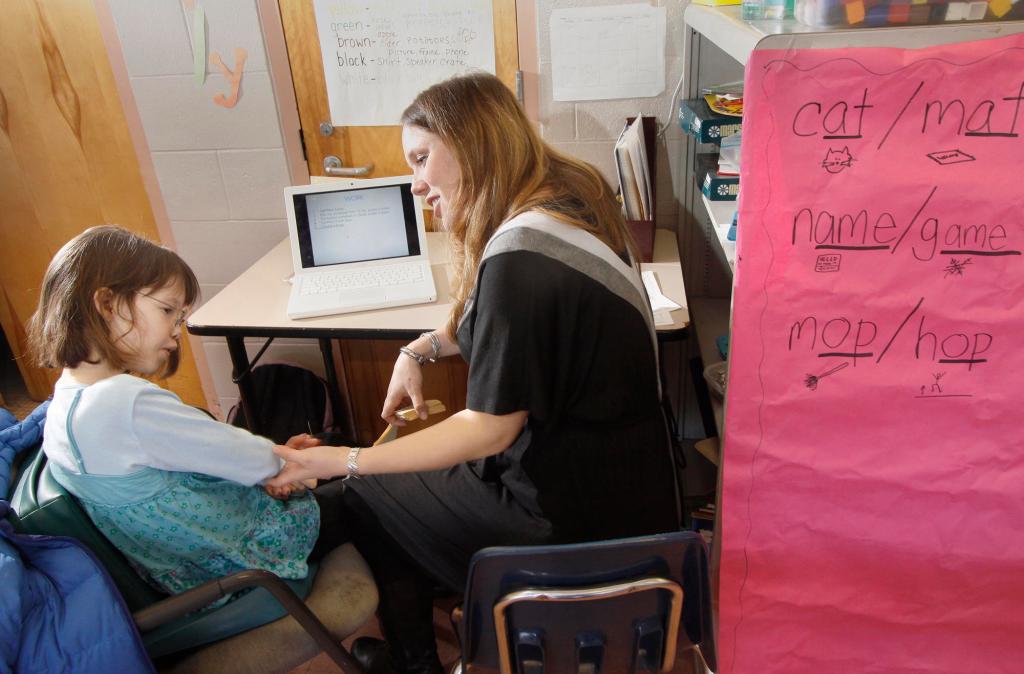PORTLAND – Jeff and Kirsten Martin are used to defending their daughter, Emily.
They’ve been fighting for her since doctors advised Kirsten to have an abortion after a sonogram foreshadowed Emily’s many physical and mental disabilities.
Emily is a talkative, affectionate 12-year-old who was born with dislocated hips, hydrocephalus, commonly known as water on the brain, and other brain abnormalities. She had a stroke when she was 21 days old, was fed through a tube in her abdomen until she was 6 years old and continues to need almost constant care and regular medical treatment.
The Martins say their battles have eased lately because of Paige Fournier, a young, inspired and innovative special education teacher in the self-contained Functional Life Skills classroom at Moore Middle School.
They say Fournier has been instrumental in transforming Emily from a child who was allowed to sleep through half of her elementary school years into a child who, for the first time in her life, is seen as a person who can learn.
”Paige expects more from her students,” said Kirsten Martin, 38. ”She knows what they’re capable of, and she pushes them. She sees their potential before they even show it.”
While the Martins embrace Fournier’s efforts, they say they now realize all that was lacking in Emily’s elementary education, when teachers seemed to focus on Emily’s disabilities rather than her abilities.
They say their mixed experience with Portland’s special education program lends credence to a recent critical review by American Educational Consultants of Beachwood, Ohio. They hope the consultants’ report is used as a positive force for change.
”Every organization has to take a step back once in a while and review what they do and how they do it,” said Jeff Martin, 39, who owns a property management firm. ”It’s going to be scary, and maybe everybody isn’t going to like the outcome, but some things really have to change.”
The consultants concluded that Portland could save $2.5 million on special education by reorganizing its administration, eliminating as many as 40 of 239 teaching positions and creating a centralized intervention program that represents current best practices.
The Martins and other parents of special education students worry that the consultants’ recommendations will lead school officials to reduce staffing without considering the learning needs of individual students. They also worry that the newest special education teachers with the least seniority will be cut without regard for who’s doing the best job.
But they agree that a lack of central oversight and support for special education in the city’s 18 school buildings creates disparities in the amount and quality of services that students receive.
”It’s clear there is a lack of defined leadership and consistency in Portland’s special education programs,” said Tina Kenney, mother of a child with Asperger’s syndrome, a mild form of autism, who attends Lyseth Elementary School.
Kenney is an autism advocate who is promoting legislation that would increase training requirements for teachers of autistic children in Maine schools. Last year, Kenney said, she paid to send four of her son’s teachers to an autism education conference because the district wouldn’t cover the $360 cost.
”My son’s teachers and special educators are wonderful,” Kenney said. ”We’ve seen a lot of progress with our child. But a lot of it is because they cared, because of their individual effort, not because of anything the district did.”
The lack of continuity across the district also generates anxiety among parents and students as they transition between schools and grade levels, especially from elementary to middle school and from middle to high school.
Kirsten Martin was terrified about Emily’s transition to middle school until she met Paige Fournier. Now, as Emily enters the final months of seventh grade, her mother has already begun fretting about what will happen after eighth grade.
”I’m scared for high school because I don’t know what we’re going to get,” said Martin, who also has a 7-year-old son, Jack.
Emily attended Riverton Community School, where she was enrolled in the Functional Life Skills program and had a variety of special education and regular classroom teachers.
Martin credits the teachers and therapists at Riverton with helping Emily learn to walk, but she now believes that they did her daughter a disservice with their low academic expectations.
Martin said she had to coax Riverton staff members to include Emily in mainstream classes and often was frustrated that Emily was allowed to sleep at school when she was a chatterbox the rest of the day.
”It was more like day care,” Martin said. ”They’re supposed to be the professionals, so you never think to question their expectations. But looking back, I think they were more willing to see Emily’s limits than her potential.”
Jill Blackwood, assistant superintendent and former Riverton principal, said she and the teachers at Riverton were more concerned about Emily’s education than the Martins may recall, though she understands that the Martins may be having a more fruitful experience with Fournier. Blackwood also said she always encourages mainstreaming.
”Emily had a very rich program at Riverton,” Blackwood said. ”Each stage of special education builds on the one before. A lot of dedicated thought and collaboration goes into each child’s program. That’s business as usual for the teachers and therapists who work with our more complicated cases.”
Martin isn’t so sure. She says she didn’t expect more for Emily until she met Fournier.
The difference was apparent a few days into sixth grade, when Fournier called Martin and asked if there was a medical reason that Emily slept so much. Martin told her there wasn’t. She shared her theory that Emily fell asleep because she was bored and noted that Emily had memorized the alphabet by age 3 and every Disney song since then.
”From that moment on, there was no more sleeping,” Martin said.
With Martin’s permission, Fournier videotaped Emily’s behavior in class, then she accompanied Emily on a doctor’s visit. After seeing the video, Emily’s doctor adjusted her seizure and behavior medications — a move that fundamentally changed the way Emily performed as a student.
”This year they did advanced testing, something they had never done before, and it showed that Emily has the ability to learn,” Martin said. ”Now, Emily is learning to read and write.”
Fournier develops lessons that tap in to Emily’s fascination with Broadway musicals, the Internet and YouTube. Fournier also seeks ways to include all five of her students in a variety of school activities, including the chorus, physical education classes, after-school dances and girls’ soccer games, which Fournier coaches.
Fournier, who started teaching in 2003, downplays her efforts and shares the credit with the educational technicians and therapists who work with her students.
”Our team wants all our students to be the best they can be,” Fournier said. ”We try to make it fun so they enjoy themselves, but we also have a philosophy of challenging them to succeed.”
The Martins believe Emily is lucky to have Fournier as a teacher. But after years of fighting for their daughter, they’d rather not leave her education to fate.
”I don’t want it to be a crapshoot,” Kirsten Martin said. ”I want every student in Portland to have the same opportunity, no matter what school they attend or the level of their ability.”
Staff Writer Kelley Bouchard can be contacted at 791-6328 or at: kbouchard@pressherald.com
Send questions/comments to the editors.



